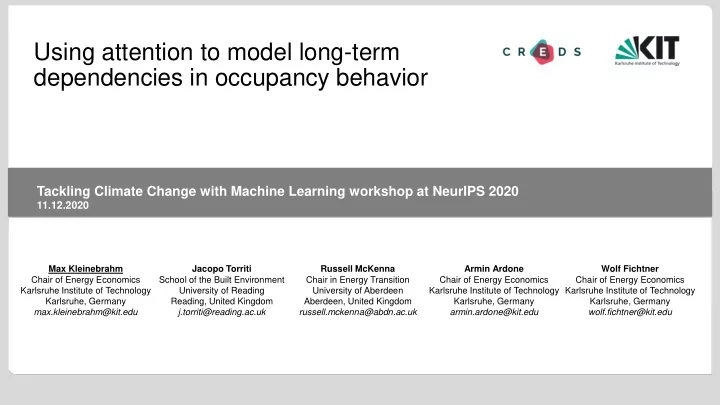

Using attention to model long-term dependencies in occupancy behavior Tackling Climate Change with Machine Learning workshop at NeurIPS 2020 11.12.2020 Max Kleinebrahm Jacopo Torriti Russell McKenna Armin Ardone Wolf Fichtner Chair of Energy Economics School of the Built Environment Chair in Energy Transition Chair of Energy Economics Chair of Energy Economics Karlsruhe Institute of Technology University of Reading University of Aberdeen Karlsruhe Institute of Technology Karlsruhe Institute of Technology Karlsruhe, Germany Reading, United Kingdom Aberdeen, United Kingdom Karlsruhe, Germany Karlsruhe, Germany max.kleinebrahm@kit.edu j.torriti@reading.ac.uk russell.mckenna@abdn.ac.uk armin.ardone@kit.edu wolf.fichtner@kit.edu
Motivation & objective Why is it important to capture long-term behavioral dependencies in occupant behavior models to tackle climate change? Occupant behavior has a significant impact on the dynamics of household energy consumption [1] Existing studies try to simulate occupant behavior to explain aggregated energy demand [2,3,4] Low quality individual occupant activity schedules Decarbonisation of domestic energy demand (electricity, heat, mobility) New technologies: heat pumps, electric vehicles, batteries,… Flexibility potential Representing long-term dependencies in occupant behavior models in order to generate high quality synthetic activity schedules 2 NIPS 2020 - Tackling Climate Change with Machine Learning workshop - Using attention to model long-term dependencies in occupancy behavior
Input data Activity data Mobility data National representative samples (DE, UK, …) National representative samples (30 countries) Highly differentiated states of activity Longitudinal mobility study Information about two to three individual days Information about mobility patterns over one week This study: German TUD [5] This study: German Mobility Panel (MOP) [6] 3 NIPS 2020 - Tackling Climate Change with Machine Learning workshop - Using attention to model long-term dependencies in occupancy behavior
Model architecture Mobility dataset Activity dataset Synthetic weekly activity & mobility Synthetic weekly Training 1. 2. Training schedules mobility schedules Autoregressive model Imputation model b c d a c Inference Inference Input … a b c ? b ? a b ? 4 NIPS 2020 - Tackling Climate Change with Machine Learning workshop - Using attention to model long-term dependencies in occupancy behavior
Input & first layers 5 NIPS 2020 - Tackling Climate Change with Machine Learning workshop - Using attention to model long-term dependencies in occupancy behavior
Autoregressive & imputation model 6 NIPS 2020 - Tackling Climate Change with Machine Learning workshop - Using attention to model long-term dependencies in occupancy behavior
Exemplary results Weekly activity schedule (age: 55, job: full time) Weekly activity schedule (age: 15, job: student) Visual control: Interday dependencies are reproduced Behavior of different socio- demographic groups is captured Aggregated metrics: Time of day Time of day State: mobile (driving car) Hamming distance weekdays State probability mean + .25/.75 quantiles State duration empirical State autocorrelation Weekly appearances of state attention Hamming distance between weekdays : markov 5 5 ℎ𝑒 𝑜 = | 𝑢 ∈ 1, … , 𝑈 𝑒 | 𝑡 𝑒 1 ,𝑢 ≠ 𝑡 𝑒 2 ,𝑢 | ∀ 𝑜 ∈ 𝑂 𝑒 1 =1 𝑒 2 =1 7 NIPS 2020 - Tackling Climate Change with Machine Learning workshop - Using attention to model long-term dependencies in occupancy behavior
Conclusion & outlook & challenges Conclusion: Attention based models can capture complex long-term dependencies in occupancy behavior The diversity in behavior across the entire population and different socio-demographic groups is adequately reproduced by the presented approach The approach combines the advantages of two datasets and creates a new high quality synthetic dataset for energy system modelers Outlook: Individual behavior household behavior ( challenge : quadratic memory and time complexity with sequence length) Open data differential privacy ( challenge : trade off between accuracy and privacy) 8 NIPS 2020 - Tackling Climate Change with Machine Learning workshop - Using attention to model long-term dependencies in occupancy behavior
Thanks for your attention! 𝑹𝑳 𝑼 𝐭𝐩𝐠𝐮𝐧𝐛𝐲 𝒆 𝒍 𝑾 ! 9 NIPS 2020 - Tackling Climate Change with Machine Learning workshop - Using attention to model long-term dependencies in occupancy behavior
Literature [1] Koen Steemers and Geun Young Yun. Household energy consumption: A study of the role of occupants. Building Research & Information, 37(5-6):625 – 637, 2009. [2] Richardson, Ian; Thomson, Murray; Infield, David; Clifford, Conor (2010): Domestic electricity use. A high-resolution energy demand model. In Energy and Buildings 42 (10), pp. 1878 – 1887. DOI: 10.1016/j.enbuild.2010.05.023. [3] Fischer, David; Härtl, Andreas; Wille-Haussmann, Bernhard (2015): Model for electric load profiles with high time resolution for German households. In Energy and Buildings 92, pp. 170 – 179. DOI: 10.1016/j.enbuild.2015.01.058. [4] Pflugradt, Noah Daniel (2016): Modellierung von Wasser und Energieverbräuchen in Haushalten. Available online at http://nbn-resolving.de/urn:nbn:de:bsz:ch1-qucosa-209036, checked on 4/12/2018. [5] Destatis (2006): Zeitbudgeterhebung: Aktivitäten in Stunden und Minuten nach Geschlecht, Alter und Haushaltstyp. Zeitbudgets - Tabellenband I. 2001/2002. Wiesbaden. Available online at https://www.statistischebibliothek.de/mir/receive/DEMonografie_mods_00003054. [6] Weiß, Christine; Chlond, Bastian; Hilgert, Tim; Vortisch, Peter (2016): Deutsches Mobilitätspanel (MOP) - wissenschaftliche Begleitung und Auswertungen, Bericht 2014/2015. Alltagsmobilität und Fahrleistung, checked on 10/22/2019. 10 NIPS 2020 - Tackling Climate Change with Machine Learning workshop - Using attention to model long-term dependencies in occupancy behavior
Recommend
More recommend